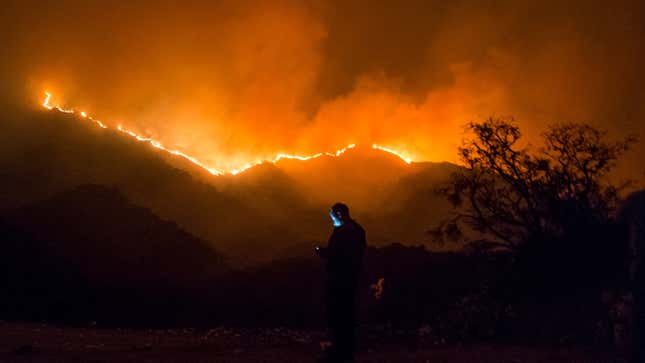
While I think we can all agree that every app on our phone is probably an invasive little shit, I’d argue that weather apps deserve their own little corner in hell. We’ve seen weather apps sign folks up for services without their say-so, sneakily get location data from users who deliberately turned that function off, and pull all other sorts of stunts that make it clear just how little these companies care about giving its users any choice about opting out.
Case in point: Earlier today, IBM Watson Advertising—aka the advertising arm for IBM’s Weather Company enterprise—announced it will be rolling out a new way to track and target us all in a way that’s supposedly more privacy-forward than the typical cookie-adjacent tech we’ve all come to know and loathe. Their answer, apparently, is to lump a ton of other types of sensitive data like what we buy and where we shop from the good folks over at Nielsen, and use that instead. As IBM explains:
Watson Advertising Weather Targeting leverages enterprise-grade AI to analyze over 500 advertising triggers with up to six variables per trigger across 42,000 zip codes every hour, increasing the amount of actionable insights the company generates for brands.
With this collaboration, IBM Watson Advertising will introduce a new suite of triggers and insight reports that will harness Nielsen’s RMS data and weather from IBM’s The Weather Company to provide brands with actionable advertising solutions that do not rely on personally identifiable information, third-party cookies or identifiers.
That’s largely marketing speak, so let’s give some context here: Up until now, The Weather Channel’s app—just like countless other free-to-download apps—partially relied on pawning certain identifiers, like your device’s unique mobile advertising ID and location, into marketers’ hands as a way to make ends meet. Despite the fact that combining a unique tag on a given phone with that phone’s location gives both marketers and federal officials the ability to trace and target that phone and its owner with pretty terrifying accuracy, up until pretty recently the ad industry managed to hide behind the excuse that because this data didn’t, say, contain any directly identifiable information (like a phone owner’s name or address), nuggets like that mobile identifier were deemed effectively “anonymous” and untouched by current privacy regulations here in the US.
But either because of the regulatory writing on the wall across the pond, or because Apple was just getting too darn tired of competitors building massive mobile ID-based businesses without giving it any sort of a cut, the company announced at this year’s WWDC that the iOS 14 software upgrade this fall would allow iPhone users to put a stop to an app’s ability to collect this mobile ID without that user’s explicit consent, the same way the company’s previous OS update cracked down on location permission settings. Naturally, the ad industry flipped out, with players across the planet struggling to figure out a new way to track and target consumers (against their will or otherwise) with the new update, while Apple generously gave them half a year to presumably sort their shit out.
Which brings us to The Weather Channel’s announcement. Ultimately, if the company’s app is cut off from our phone’s tags or precise location over the next few months, the effects on its business—or our privacy—will ultimately be minimal. While the app’s probably best known for, well, collecting data on the weather, it’s also spent the past two years aggregating even more data from third-party brokers to figure out the way that weather impacts how we surf the web and shop in stores. Now that tracking the way we surf is a smidge harder, it makes sense that the Watson team needs to shift its focus onto shopping. The end result isn’t that we’re tracked any less, just that we’re tracked in a different way.
As Watson Advertising’s global lead, Sheri Bachstein, told the ad-industry rag AdExchanger about the announcement:
The weather, for example, invokes certain moods in people and can have a direct impact on their buying behavior in a way that goes beyond umbrella buying during a rainstorm or ordering snow boots in the winter.
Watson tracks aggregate behavior in an effort to reveal the less obvious stuff, Bachstein said.
For instance, it found that sales of baking chocolate and cocoa increased by 62% in northwest central states, such as Kansas, Iowa and Missouri, during an unseasonably warm and rainy one-day forecast, while wine sales were up by 25% during a one-day forecast for clear conditions in east north central United States, which includes Illinois, Indiana and Michigan.
“Factors like humidity, temperature and other weather-related data points can actually be quite revealing,” Bachstein said.
In other words, The Weather App isn’t just telling marketing types whether it’s raining where I happen to be, but also how I’m gonna respond to that particular bout of bad weather, and whether I’m the type to stay inside and bake, stay inside and binge drink, or stay inside and not do anything at all. It’s not just about tracking the weather, but tracking the way it’s impacting our collective moods as a whole.
Right now, a lot of folks can probably sum up that mood in one word: fear. Some of the most damaging wildfires in recent memory are raging across the West Coast right now, forcing hundreds of thousands of people to flee their homes and killing more than 30 thus far. Meanwhile, states like Mississippi and Alabama are gearing up for the second massive hurricane to hit the Gulf Coast in less than a month. In situations like these, where sticking your head outside to check the weather means getting a lungful of ash or worse, digital tools for tracking the weather—apps included—are less of a luxury and more of a necessity. And as far as IBM’s concerned, it’s a necessity that’s extremely lucrative, whether you realize it or not.